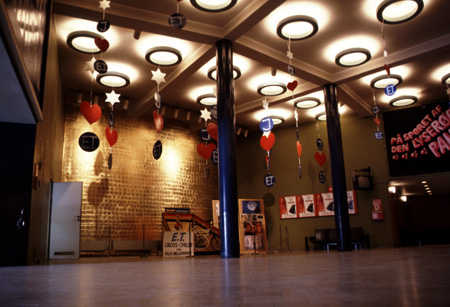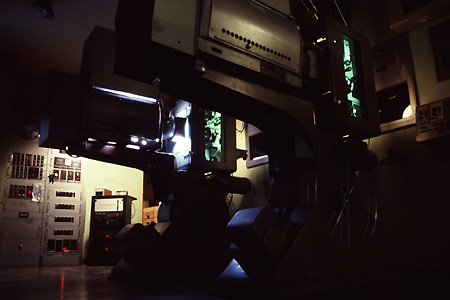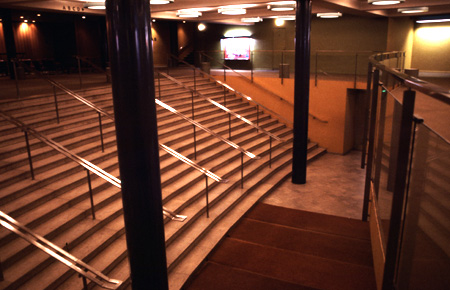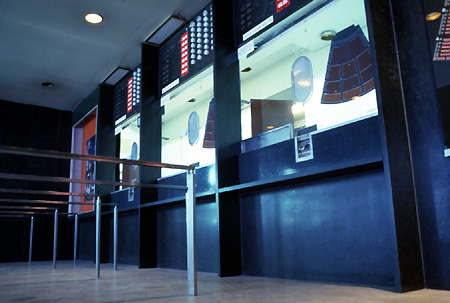Imperial Bio - Design for Copenhagen
|
Read more
at in70mm.com The 70mm Newsletter |
| Written by: Kinematograph Weekly | Date: 12.04.1962 |
 The
Imperial Bio in 1982. Picture by Thomas Hauerslev The
Imperial Bio in 1982. Picture by Thomas HauerslevScandinavian designers have the reputation of being amongst the best designers in the world, and certainly they maintain their reputation so far as the new Imperial cinema, Copenhagen, is concerned: it has been described as the most modem and best designed cinema in Northern Europe. The Imperial is in the heart of Copenhagen and is part of an enormous block of offices, plus one of Copenhagen's lush hotels, also called the Imperial. There is also a very large garage with special parking facilities for the cinema's customers. The whole development cost about £3,000,000, the most expensive to date in this lovely city. |
More
in 70mm reading: 70mm Cinemas and Film in Denmark Three Great Danish 70mm Cinemas • Go to The 3 Falke Bio | Kinopalæet | Imperial Bio | THX Ultimate Cinema Coming to the Nordisk Film Iconic Imperial Theater in Copenhagen |
 The
Imperial Bio in 1982. Picture by Thomas Hauerslev The
Imperial Bio in 1982. Picture by Thomas HauerslevThe cinema itself lies in the centre of the building and has an imposing frontage surrounded by shops. There are extremely large glass doors leading directly to the five cash boxes in a row. One then enters the main vestibule, which also houses several window displays as well as various sales kiosks. The main vestibule, which has a very high ceiling and is decorated in pastel shade, can easily accommodate close on a thousand people - very wide staircase leads up to the next vestibule where one finds well equipped, spacious cloakrooms divided into blocks which tally with the seat numbers, thus making it easy both to leave and collect coats. In this second vestibule there is also an extremely attractive bar: Danish cinemas, unlike their English brethren, are allowed to sell liquor. |
|
 The
Imperial Bio in 1982. Picture by Thomas Hauerslev The
Imperial Bio in 1982. Picture by Thomas HauerslevLeading from the second vestibule are galleries which overlook the ground floor vestibule, so that on gala nights, for instance, the audience can easily watch celebrities coming in to the theatre without getting in anybody's way. The second vestibule is covered with a grey carpet, which is also used inside the theatre. The walls make good use of wood. All Danish cinemas are run on a "hard ticket" po1icy - in other words, all seats are always bookable. To facilitate "quick loading" there are a number of entrances to the auditorium, all clearly marked as to which seats they serve. It is also usual for outgoing audiences to leave by special exit doors so that they have not to push through the people waiting to come in. |
|
 The
Imperial Bio in 1982. Picture by Thomas Hauerslev The
Imperial Bio in 1982. Picture by Thomas HauerslevThe auditorium is an amphitheatre in shape and seats 1,521 people in large, well-designed seats with more than ample leg room between the rows. In fact, there is no real need to stand up to allow people to pass by. The seats are upholstered with a strong wool fabric and are in several shades of pastel red. The lighting is diffused, corning from behind a modernistic wall motif. Not least of the assets the theatre has is its "cold ceiling" which provides most efficient air-conditioning. It is also responsible for the heating. It has a pleasant blue tint and is a thousand square metres in size. |
|
 The
Imperial Bio in 1982. Picture by Thomas Hauerslev The
Imperial Bio in 1982. Picture by Thomas HauerslevThe projection room has been designed for the comfort of the staff as well as for modern efficiency. For Todd-AO pictures there are Philips DP70 machines with Unisol arcs. There is also a Philips FP56 and a Leitz 16mm professional projector with a 70 amperes arc. The 16mm is often used for specia1 shows, conferences. The throw is 34.2 metres, giving the following screen sizes : Todd-AO, 17 metres x 7,7 metres; CinemaScope, 17 metres x 7.4 metres; wide screen, 13 metres x 7.4 metres standard and 16mm, 10 metres x 7.4 metres. The sound system throughout is by Bang and Olufsen, and is fitted for eight track stereophonic. Five speakers are behind the screen and eight along each of the side walls. There is also a telemagnetic cord-less deaf-aid system which enable people wearing their own deaf-aids to pick up the sound by induction from the side walls which contain special cables transmitting the sound. Responsibility for the day-to-day running of the theatre plus the booking of programmes is in the bands of Jørgen Nielsen, previously manager for United Artists in Denmark. |
|
|
Go: back
- top - back issues
- news index Updated 22-01-25 |
|
